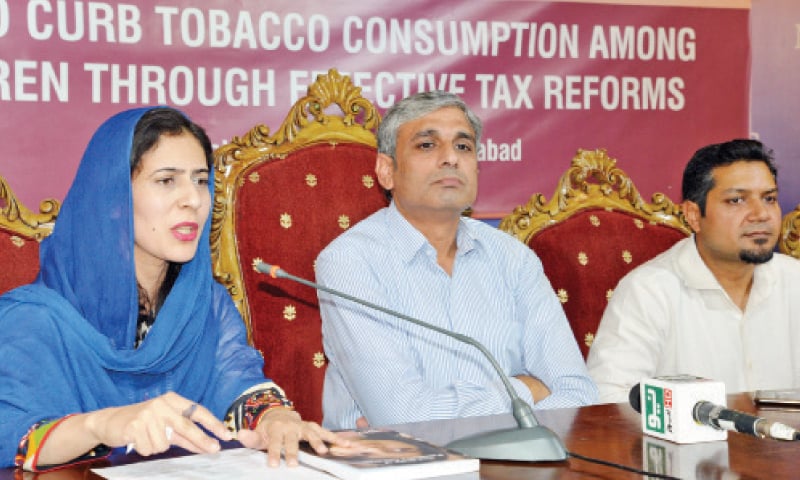ISLAMABAD: The minimum price of each cigarette packet should be Rs100 because tobacco is the first step towards drug addiction, a child rights’ organisation said on Tuesday.
Speaking at a press conference at the National Press Club, Society for the Protection of the Rights of the Child (Sparc) Executive Director Sajjad Cheema said that some 1,200 children in the country between the ages of six and 15 start smoking every day, according to the Global Adult Tobacco Survey, 2015.
Some 60pc of the Pakistani population is below the age of 25 and an alarming number of young people are getting addicted and are at risk of starting tobacco consumption.
“The healthcare burden, which is Rs143 billion, compared to the revenue generation at Rs83 billion is causing losses to the federal exchequer,” he said.
Mr Cheema suggested the government implement a sin tax on tobacco products. A sin tax is an instrument of excise tax, specifically levied on certain goods which are deemed injurious to the society.
1,200 Pakistani children between six and 15 take up smoking every day, child rights organisation says
He said the retail price of a cigarette should not be less than Rs100 in order to discourage minors from easy access to tobacco. Although the Federal Excise Duty on tobacco has been increased from Rs16 to Rs25, it has not yielded substantive tax collection.
Mr Cheema quoted the Prohibition of Smoking and Protection of Non-Smokers Health Ordinance 2002, which includes measures to stop people from smoking in public, a ban on access to tobacco products near educational institutions and restriction on sale of cigarettes to those under 18.
However, he added, it has been reported that no complaints have been registered against violators under this law.
“The complaint lodging mechanism should not be complicated for a common man. There is also a need for initiating a drive regarding educating people about reporting procedure and its aftermath. In 2017, the Senate Standing Committee on National Health Services, Regulations and Coordination directed for the enforcement of tobacco control laws by nominating a focal person from respective ministries,” he said.
Mr Cheema added that it has been noted that the majority of people take up smoking in their adolescence and that it is therefore important to curb tobacco consumption among teens.
Sale to underage persons and of loose cigarettes has already been outlawed and the ban is being strictly observed in many areas in the country.
Sparc Manager Programme Development Asiya Arif said Pakistan is signatory to the World Health Organisation’s Framework Convention on Tobacco Control (FCTC) since 2005 under which it pledged to ensure smoke-free public places, reduction of tobacco advertisements and promotion and raising tobacco taxes and prices.
Health targets under Sustainable Development Goal’s also call upon the states to ensure compliance with FCTC, she added.
Published in Dawn, October 17th, 2018













































Dear visitor, the comments section is undergoing an overhaul and will return soon.